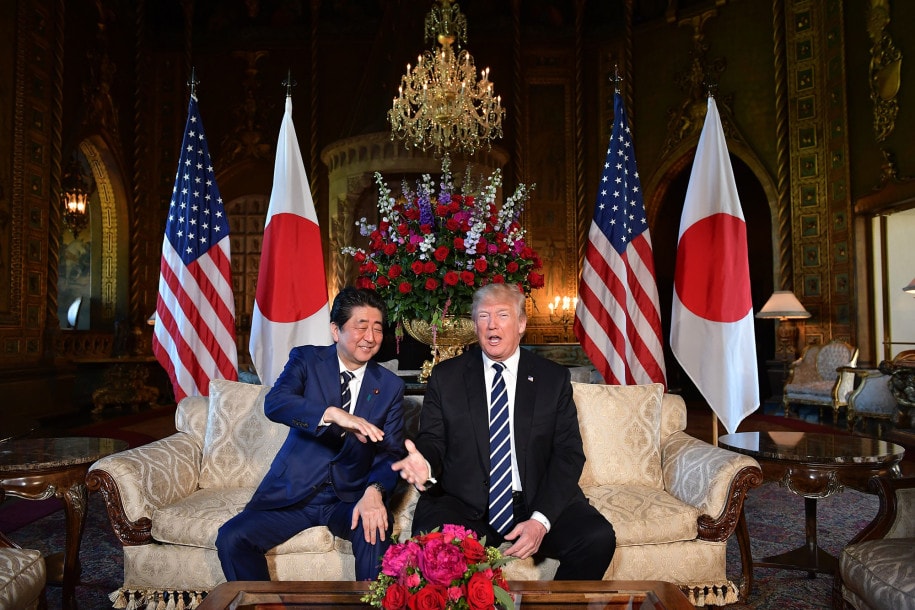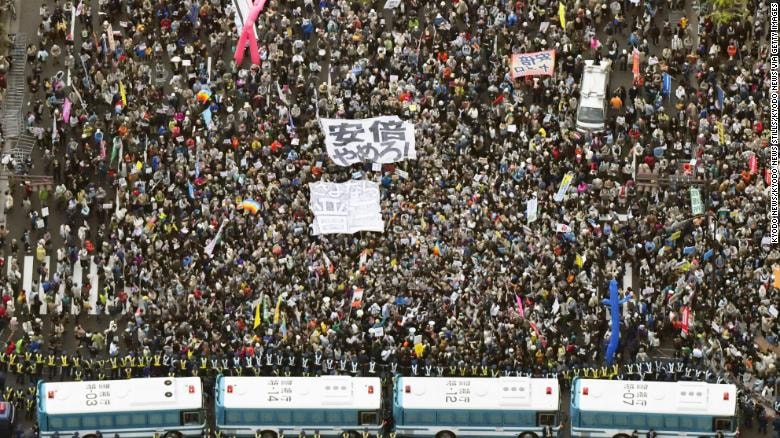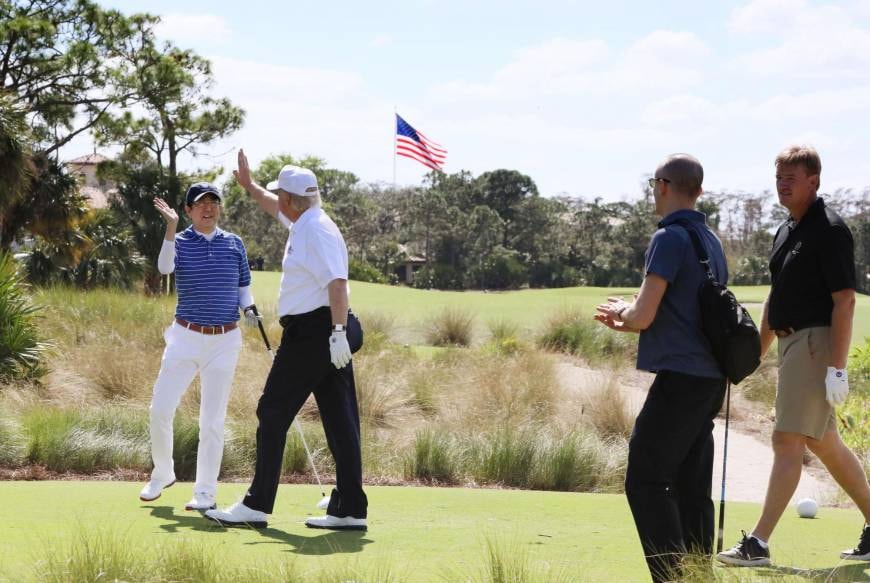US-Japan allies struggle to "warm up" relations
(Baonghean) - Japanese Prime Minister Shinzo Abe is making his second visit to the US since his counterpart, President Donald Trump, took office. But unlike before, this visit takes place in the context of the close US-Japan alliance facing many difficulties, such as economic and trade cooperation and especially the North Korean nuclear and missile issue, when Japan seems to be "left out" in a series of warming moves on the Korean peninsula. Will this visit resolve the existing problems and disagreements?
 |
| US President Donald Trump and Japanese Prime Minister Shinzo Abe at Mar-a-Lago, Florida. Photo: Getty |
Sensitive time
Looking at the prominent headlines in the international press in recent days, one can immediately imagine the context and purpose that Japanese Prime Minister Shinzo Abe cherished during his visit to the US this time.“Japanese Prime Minister Visits the US Amid Internal and External Turmoil”, “Can the Mar-a-Lago Dialogue Rescue US-Japan Relations?”good“Prime Minister Abe visits the US to regain his voice in the game with North Korea”…
First of all, it is not difficult to explain why Prime Minister Shinzo Abe chose this time to seek out his American ally. People often say that good friends are enthusiastic in helping each other when in trouble, and Prime Minister Abe's situation this time is no exception.
Prime Minister Shinzo Abe heads to the US with his domestic approval rating falling to just 26.7%, the lowest since he took office in December 2012.
The reason is that Prime Minister Abe's administration is facing a lot of criticism related to a scandal of buying public land by the private educational organization Moritomo Gakuen. Despite Mr. Abe and his wife's recent steadfast denial of involvement, the opposition has continued to pressure the Prime Minister to resign.
In addition to internal troubles, Prime Minister Abe is also said to be facing a "half-laughing, half-crying" situation in foreign policy. Accordingly, Mr. Abe seems to be "left out" in international diplomatic efforts to resolve the North Korea issue, mediated by South Korea. Meanwhile, Japan has always been an indispensable part and is also one of the countries most frequently facing the risks from North Korea's ballistic missile program.
 |
| A Kyodo news agency helicopter photo taken on April 14 shows about 30,000 people gathered in front of the National Assembly to demand Prime Minister Shinzo Abe resign after a series of recent scandals. Photo: Kyodo |
Refuse to be "left out"
In the context of internal and external turmoil, right before the visit and press conference with US President Donald Trump at Mar-a-Lago, Prime Minister Abe immediately affirmed that he wanted to reaffirm the cooperation between the US and Japan on the North Korea issue. Perhaps, Prime Minister Abe wants the US ally to carefully consider agreements with North Korea that could be disadvantageous to Japan. These include agreements in which North Korea, although agreeing to give up intercontinental ballistic missiles that can reach the US, continues to develop short-range missiles capable of attacking Tokyo.
Especially in the context that two important conferences, the inter-Korean summit and the US-North Korea summit, are being actively prepared by all parties - without Japan's participation in any role. Therefore, the North Korean issue has been considered a test for the US-Japan alliance, which considers Pyongyang's nuclear and missile records as one of the ties connecting the two sides.
Of course, for his part, President Donald Trump has made a statement reassuring Prime Minister Abe that the US is always concerned about the security of its allies as much as it is about its own. At the same time, the US remains determined to implement a strategy of complete, credible and irreversible denuclearization of the Korean Peninsula. Mr. Trump in his statement also pledged to raise Japan's concerns not only on the North Korean issue but also on the issue of abducted Japanese citizens.
Obviously, with an important ally in the Asian region like Japan, the Trump administration can hardly “ignore” Tokyo’s wishes. Currently, the US still has about 50,000 soldiers stationed at military bases in Japan. Therefore, it is undeniable that the US-Japan alliance is a cohesive bloc that contributes to maintaining the voice and influence of the US in the world’s leading geostrategic and dynamic region, the Asia-Pacific.
Therefore, this can be said to be one of the most important foundations in the US foreign policy towards the region. Especially in the context that the US's "heavyweight" rival, China, is expanding and strengthening its position and influence not only in the region but also around the world.
 |
| Golf diplomacy is a specialty in the relationship between the two US and Japanese leaders. Photo: Japan Times |
"Gently remind" allies
Of course, the Japanese Prime Minister certainly did not forget to "gently remind" his American counterpart about the benefits that Washington has gained through Japan in terms of economic and trade issues, not as Mr. Trump still thinks, Tokyo always benefits more and the US suffers more in bilateral trade relations. It can be mentioned that Japanese steel products have helped cars produced in the US become more competitive in price. This "reminder" is especially meaningful in the context that the US recently, despite its alliance relationship, did not include Japan in the list of countries exempted from the newly issued aluminum and steel import tariffs.
Not only that, the Japanese Prime Minister will also focus on the possibility of the US rejoining the TPP as recently announced by the US President. Once the US can actually return to the TPP, Japan can revive its economic co-leadership role in the region, which will also mean that domestic voters will have more confidence in the Abenomic economic strategy that Mr. Abe is still promoting. This will be a very good stepping stone before the election of the President of the Liberal Democratic Party (LDP) next September.
As for the US, in addition to seeking a fairer trade partnership with Japan, President Trump certainly does not want to miss the opportunity to return to the role of creating the foundation for building a large free trade area led by the US. Especially in the context of increasing US-China trade tensions and Beijing having more advantages in this area in the region. Although right after meeting Prime Minister Abe at Mar-a-Lago recently, Mr. Trump once again "criticized" the TPP on his personal Twitter page. However, "criticizing" is one thing, what is the reality is another!
Therefore, although he may have his own calculations for the North Korea issue, it is certain that US President Donald Trump will find it difficult to “turn his back” on his good and trusted friend in the region, Japan. And that the Japanese Prime Minister will more or less achieve the goals set out in this meaningful trip.
“Trump - Abe: Good personal relationship”
Not only are they close allies, President Donald Trump and Prime Minister Shinzo Abe have also had a very good relationship since Trump took office. While many leaders of countries, including allied countries, disagree with Trump on a number of issues, Prime Minister Abe has publicly supported Trump, even though his American counterpart has repeatedly "complained" about the unfair relationship with Tokyo. Abe was also the first foreign leader to meet Trump at the Mar-a-Lago resort after Trump's victory in late 2016. The two also regularly have phone conversations and give each other gifts like true friends. Right after Trump was elected President, Abe gave Trump a golf club, both to congratulate him on his victory and to share their common interests.

